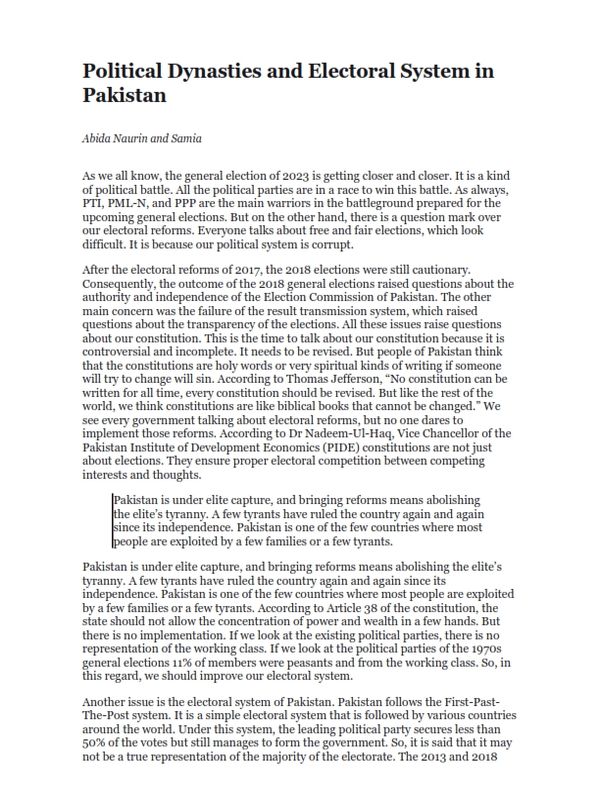
Pakistan Institute of Development Economics
- Home
Our Portals
MenuMenuMenuMenuMenuMenuMenu - ResearchMenuMenuMenuMenuMenuMenuMenu
- Discourse
- The PDR
- Our Researchers
- Academics
- Degree Verification
- Thesis Portal
- Our Portals
Political Dynasties and Electoral System in Pakistan
As we all know, the general election of 2023 is getting closer and closer. It is a kind of political battle. All the political parties are in a race to win this battle. As always, PTI, PML-N, and PPP are the main warriors in the battleground prepared for the upcoming general elections. But on the other hand, there is a question mark over our electoral reforms. Everyone talks about free and fair elections, which look difficult. It is because our political system is corrupt.
After the electoral reforms of 2017, the 2018 elections were still cautionary. Consequently, the outcome of the 2018 general elections raised questions about the authority and independence of the Election Commission of Pakistan. The other main concern was the failure of the result transmission system, which raised questions about the transparency of the elections. All these issues raise questions about our constitution. This is the time to talk about our constitution because it is controversial and incomplete. It needs to be revised. But people of Pakistan think that the constitutions are holy words or very spiritual kinds of writing if someone will try to change will sin. According to Thomas Jefferson, “No constitution can be written for all time, every constitution should be revised. But like the rest of the world, we think constitutions are like biblical books that cannot be changed.” We see every government talking about electoral reforms, but no one dares to implement those reforms. According to Dr Nadeem-Ul-Haq, Vice Chancellor of the Pakistan Institute of Development Economics (PIDE) constitutions are not just about elections. They ensure proper electoral competition between competing interests and thoughts.
Pakistan is under elite capture, and bringing reforms means abolishing the elite’s tyranny. A few tyrants have ruled the country again and again since its independence. Pakistan is one of the few countries where most people are exploited by a few families or a few tyrants.
Pakistan is under elite capture, and bringing reforms means abolishing the elite’s tyranny. A few tyrants have ruled the country again and again since its independence. Pakistan is one of the few countries where most people are exploited by a few families or a few tyrants. According to Article 38 of the constitution, the state should not allow the concentration of power and wealth in a few hands. But there is no implementation. If we look at the existing political parties, there is no representation of the working class. If we look at the political parties of the 1970s general elections 11% of members were peasants and from the working class. So, in this regard, we should improve our electoral system.
Another issue is the electoral system of Pakistan. Pakistan follows the First-Past-The-Post system. It is a simple electoral system that is followed by various countries around the world. Under this system, the leading political party secures less than 50% of the votes but still manages to form the government. So, it is said that it may not be a true representation of the majority of the electorate. The 2013 and 2018 elections are true examples of this system. For example, in 2013, PML-N won 33% of the vote, and in 2018, PTI won 32 % of the vote, but they still formed the majority government by bringing in independent winning candidates and MNAs from various regional parties. The same thing happened in the 1990s elections. It means it’s not a new story. It shows that the system which we have adopted is not proportionate. Obtained votes aren’t proportionate to the obtained seats. The Free and Fair Election Network (FAFEN) report also shows that the general elections are not a true representation of the majority population, and according to this report, this is one of the major reasons for the political instability in the country. The statistics indicate that the FPTP system has failed to represent the majority voice. But the bad electoral system is not the only factor dismaying the majority voice, there are other contributing factors.
The main problem is with the prevailing political parties. These are obvious forgeries. If we look at our National Assembly members, these are not 342 members, but 204 families. The seats are distributed among the relatives. Looking at our women’s representation in parliament, the women’s quota is utilized by the relatives of the existing parliamentarians. One reason is that the prevailing politicians sell their party tickets so expensively that no common person can dare purchase them. So, this system makes inexperienced people leaders because of their family background. It means that we should change the system. According to VC PIDE constitutions must properly define the distribution of power so that no one can become a Raja. Rights and justice must be carefully enshrined.
A study done by the Pakistan Institute of Development Economics (PIDE) suggests that Pakistan should adopt a proportionate electoral system. But for the PR system population needs to be highly literate, something that is not a ground reality in Pakistan. The ranked-choice voting system is another system suggested by many researchers. In this system, instead of the candidate winning the most votes getting elected, a candidate must gain a majority vote (at least 50%) to get elected from the constituency. In a nutshell, it is not easy to adopt a new electoral system and initially requires political and constitutional will.



